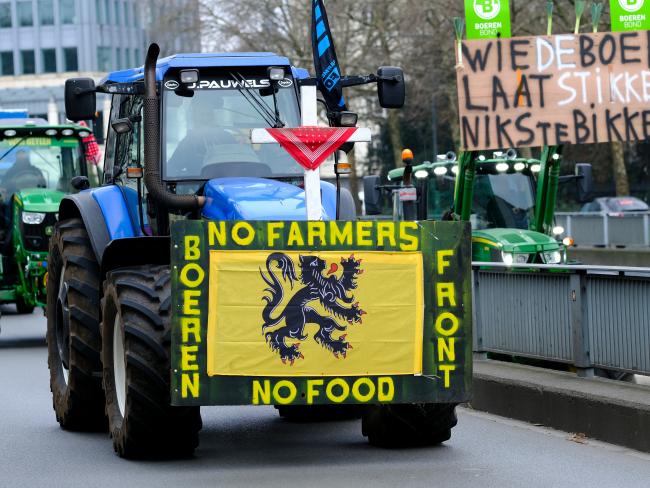9 February 2024

Belgian famers protest against plans to limit nitrogen emissions, Brussels, March 2023. Photo Alexandros Michailidis/shutterstock.com.
After years of simmering discontent, farmers’ protests are spreading across EU member countries. Thousands of farmers have been taking action, taking to the roads to demand that the EU supports food production.
There are specific national grievances, but the common demands are for changes in EU farming policies, measures to deal with huge rises in production costs (particularly energy), and measures to combat drought.
Targeted
The EU’s climate and environment policies target the agricultural sector – tax hikes, increased costs for fuel and animal feed and the obligation to set aside land for biodiversity. EU policies are strangling small and medium-sized farmers with rising energy costs, unfair trade practices and free-trade agreements.
And on top of all that, net zero polices look to farmers to reduce carbon emissions from their animals! In other words, to shut down livestock farms. This has caused political upheaval, particularly in the Netherlands.
Forced
Farmers are burdened by debt and higher costs, squeezed by powerful retailers and agrochemical companies, battered by extreme weather, and undercut by cheap foreign imports. And all while they are forced to rely on a Common Agricultural Policy subsidy system that favours only the biggest agri-food corporations.
The prices farmers get for their products fell by nearly 9 per cent on average between the third quarters of 2022 and 2023. The war in Ukraine has made matters worse. Russia’s aggression has upended trade flows, causing a supply glut.
Demands
In France, thousands of farmers are blocking roads and motorways, demanding action. They point to many issues such as damaging free-trade deals, excessive financial charges, insufficient prices for produce and unfair environmental protection rules that are cutting into their bottom line.
In January, farmers dumped piles of manure in front of city buildings in Toulouse in protest against the government’s agricultural policy. Later they surrounded Paris for days.
Lionel Monier, a Saler cattle breeder from the Auvergne region, said, “For us, it is administrative overload from the government and imports of cheaper meat and with fewer or even no standards. Also, the increase in the cost of energy scares us, including electricity and non-road diesel.”
Widespread
Action in France has been the most reported here, but it is widespread across the EU, including Germany. In Spain, there have been days of tractor demonstrations. Farmers have been blocking the motorways leading to Barcelona and Castellon. A major protest in Madrid is planned for 21 February.
“Give farmers a future”
In Italy, farmers took their protest to Milan in January, and on 8 February hundreds of tractors descended on Rome in the biggest demonstration there yet. Earlier in February farmers blocked the Dutch-Belgian border. Belgian farmers have a long-running campaign with the slogan “give farmers a future”.
It’s not just the “old” EU. In Romania, farmers are blockading imports from Ukraine, which have been depressing prices in the local market. In Poland, they are threatening the same.
The EU’s initial response to farmers’ concerns was to stick to the net zero and environmental plans, as well as spreading a few smears about right wing extremist infiltration.
Strength
But the strength of the protests has forced action – for example dropping specific mention of agriculture in emissions reduction policy and scrapping plans to halve pesticide use.
That may not be enough, given the scope of farmers’ complaints. As the Belgians have said – give farmers a future, let them produce food.
